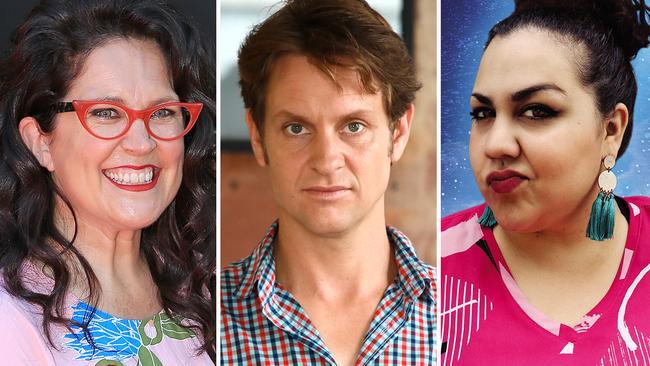
In short, the taxpayer-funded public broadcaster in the future will exhibit more cultural, gender and religious diversity. But it seems destined to remain a Conservative Free Zone without a conservative presenter, producer or editor for any of its prominent television, radio or online outlets.
As reported by Lilly Vitorovich in The Australian last Monday, Mr Anderson has said this about his wish for the ABC — namely that the broadcaster “should look and sound like and have staff that represents contemporary Australia”. He continued:
“When people talk about my priorities, the number one thing is that we reflect the diversity of this country, and in all its forms …
“That’s not just diversity of background that is diversity that sits between regional Australia, metropolitan Australia and outer suburban Australia, its socio-economic. I think that it’s something that we can improve on, and something that we need to constantly strive to do …
“We want to make sure that we reflect our audience. We want to represent the diversity that is currently in contemporary Australia.”
Well, how’s it going so far? Not so good if the ABC’s very own Australia Talks initiative is any guide. Here’s how it is being introduced to ABC viewers and listeners by the ABC’s very own Annabel Crabb:
Annabel Crabb: The ABC is a broadcaster, right? Normally we’re telling you stuff. But we’ve just conducted the greatest listening exercise in our history, to discover the issues that are on your mind.
Voices: Are you worried about losing your job? Is it okay to smack your kids? Are you lonely?
Annabel Crabb: Where do you fit? Head to ABC.net.au/australiatalks, answer a selection of the survey questions and get instant, personalised results to find out. Join the conversation across the ABC because when Australia talks, we are listening.
This is a worthy aim to find out what Australians really think. But it is essentially a form of push-polling. In that the ABC is really talking to ABC viewers/listeners about what they think. Look at it this way. Participants in the Australia Talks National Survey were selected from Vox Pop Labs’ (based at McMaster University in Canada) online respondent panel. This panel was recruited from Australians who have completed ABC Vote Compass surveys previously. In other words, the Australia Talks National Survey is primarily a survey of respondents who are accustomed to interacting with the ABC through its Vote Compass surveys. It is not a survey of all Australians.
- MORE MEDIA WATCH DOG: Waleed Aly’s missed opportunity | ABC gets a ‘D’ for homework | A right royal attack on Meghan | Facts conveniently forgotten
And then there is a matter of how the ABC presents its findings. On Monday the ABC issued this release:
“As part of Australia Talks the ABC has been sharing some interesting findings over the past couple of weeks, but we’ve been saving the best bits for this one-off TV special.
“On 18 November, join host Annabel Crabb, with co-host The Project’s Waleed Aly, as they uncover some unexpected and surprising insights into the issues big and small that get Australia talking.
“Annabel Crabb, ABC political journalist and commentator, and Waleed Aly, co-presenter of ABC RN’s The Minefield, will be joined on the night by Kitty Flanagan, Craig Reucassel, Anne Edmonds, Wyatt Roy, Adam Liaw, Rosie Batty and Steph Tisdell.
“The live 90-minute TV special will take you right across Australia to reveal the issues Aussies are actually talking about. Who is struggling hardest to make ends meet? Where do people care most and least about climate change? Which part of the country is the most patriotic, loved, and lonely and who is having the most and least sex?
“Think you’ve got a good grasp on the issues facing Australia at the moment? Prepare to have your assumptions challenged by social researcher Rebecca Huntley and writer Benjamin Law as they get to the bottom of the key issues.
“Before you watch, see where you fit at abc.net.au/australiatalks. The online tool allows you to answer a selection of the questions, and is also available in simplified Chinese, Vietnamese and Arabic.”
How about that? The hosts of the Australia Talks special will be Annabel Crabb and Waleed Aly. Both are on the left and both got the 2019 election result wrong. Then there are a collection of essentially inner-city comedians or celebrities — Kitty Flanagan, Craig Reucassel, Anne Edmonds, Adam Liaw and Steph Tisdell. None a conservative. Then there is anti-domestic violence campaigner Rosie Batty, who has indicated her support for the Greens. Then there is MP Wyatt Roy who was a Liberal MP — but of the Malcolm Turnbull kind. In other words, another manifestation of the ABC as a Conservative Free Zone.
And then participants in Australia Talks will have their assumptions challenged by Rebecca Huntley and Benjamin Law. Dr Huntley is a fine researcher — but has done research for the Labor Party. And then there is the leftist/comedian/activist Benjamin Law.
Talk about a farce. Ita Buttrose and David Anderson are promoting Australia Talks, despite the fact that it is a left-wing stack — in that not one of the eleven on-air participants is a political conservative. Moreover, there is no one from business — big, medium or small. And no worker or independent contractor or farmer. And no one from the suburbs or regional areas. And so on.
In short, Australia Talks provides yet another example of how ABC management does not run the ABC. The taxpayer funded public broadcaster remains a staff collective, or soviet, where employees do what they want to do — irrespective of the occasional Bankstown stopover.
-
Down the memory hole with Annabel Crabb, who reckons that everyone got the 2019 election result wrong (like her)
Jackie’s (male) co-owner much admires the resilience of journalists who get a political assessment totally wrong on Friday but are back at their desks on Monday to make more political assessments — as if nothing had ever happened. ABC journalists are particularly proficient in this skill — since there is no political diversity within the Conservative Free Zone that is the taxpayer funded public broadcaster and no reason for self-examination, still less self-criticism.
Take the 18 May election, for example. 7.30’s political editor Laura Tingle got the outcome of the election hopelessly wrong — predicting that Labor “will” form a government. But she was back at work the following week giving her political assessment to anyone who was prepared to listen.
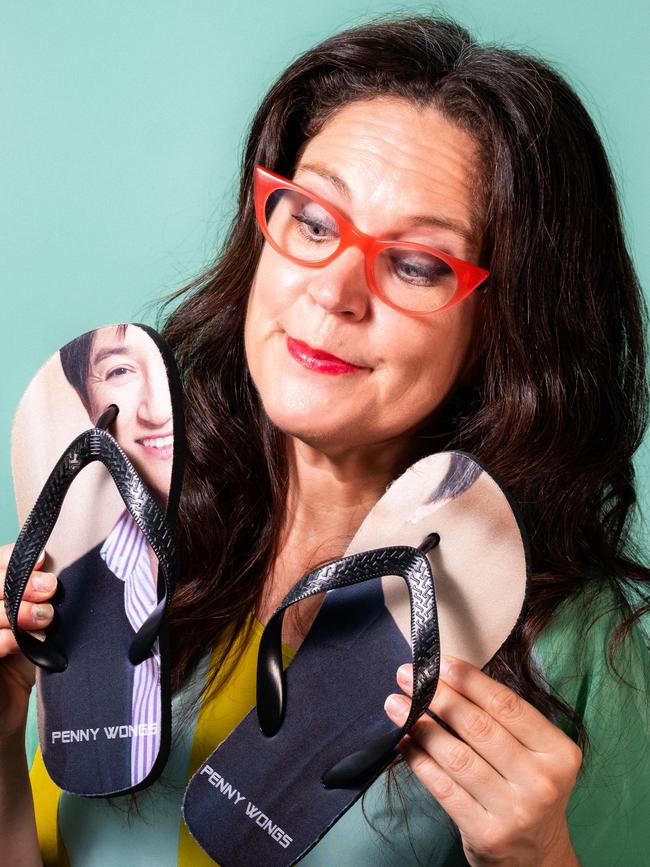
Annabel Crabb was another ABC “star” who thought that the Scott Morrison-led Coalition would be soundly defeated by Bill Shorten’s Labor. It seems that she has sought comfort for her error in (alleged) numbers — by claiming that everyone got the May election wrong. Let’s go to the transcript of Q&A last Monday when Ms Crabb was in the presenter’s chair:
John Hewson: AI [Artificial Intelligence] can get some things wrong though, can’t it?
Jordon Nguyen: AI can get many things wrong.
Annabel Crabb: Like the 2019 election, we all got that wrong.
What a load of absolute tosh. It’s simply not true that “we all” got the election outcome wrong. That’s probably true of the presenters, producers and editors of prominent ABC outlets. But it’s not true of “all” commentators. As the Adelaide-based David Penberthy has written — journalists who did talkback radio were more likely to see that the Coalition could win than those in the Canberra Press Gallery or close to the inner-city soviets in Sydney and Melbourne. Also, quite a few Sky News presenters got the election outcome correct. And then there were those commentators who said that the Coalition had a pathway to victory.
In any event, isn’t it interesting that the ABC has engaged Ms Crabb who admits to have got the May 2019 election totally wrong — to tell Australians what they really think as the presenter of the Australia Talks project? Can You Bear It?
[Er, no. Not really. I think you’ve previously referred to attending a pre-election function in Sydney when all the Aussies on the panel praised New Zealand prime minister Jacinda Ardern and predicted a Labor victory in Australia. Naming names — they were Ellen Fanning, Waleed Aly, John Hewson and, yes, Annabel Crabb. The only Kiwi on the panel — Sir John Key — thought the Australian economy was doing pretty well and expressed concern about the New Zealand economy — MWD Editor.]
-
James “I’m a Melbourne Grammar man” Campbell on reading Troy Bramston on Paul Keating in the smallest possible room
While on the topic of journalists who got the 2019 election wrong, consider the case of The Herald-Sun’s national politics editor James Campbell. He was one of a few News Corp journalists who read the political tea-leaves wrong in the lead-up to the 2019 election. Remember his column in the Herald-Sun on May 15, 2019 when your man Campbell predicted a Coalition wipe-out in the socialist republic of Victoria? MWD does.
All this reminded Jackie’s (male) co-owner of James Campbell’s appearance on Sky News’ Paul Murray Live on October 10, 2019.
Initially, discussion turned on the suggestion by Labor’s deputy leader Richard Marles that Australia should develop closer military ties with China. Panellist Bronwyn Bishop did not like the idea much and — believing that he was educated at Geelong Grammar School in Victoria — asked Mr Campbell: “Isn’t he one of your Geelong Grammar boys, James?” The suggestion was that Campbell was going soft on Marles for the sake of the Old School Tie — or the Old Fool’s Tie as Barry Humphries used to call the neckwear in question.
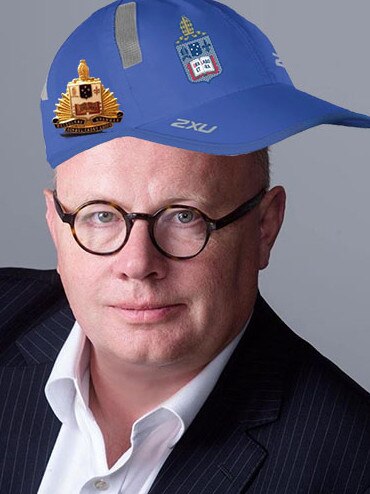
James Campbell initially missed the “your” reference and explained that Richard Marles went to GGS because his father taught there. When James Campbell defended Richard Marles’ position on China and pointed out that he was a strong supporter of the Australian American Alliance, Ms Bishop returned to her point and the following exchange took place:
Bronwyn Bishop: Is this the old boys’ network defence?
James Campbell: No, no, no, no, no, no, no. I’m a Melbourne Grammar man … I got, I got no truck for the light-blue men. Don’t worry about that. But I’ll tell you what, when one, you know, the light-blue men, they’re very, you know, they’re very charming. But, you know, you don’t want to get between them and something they want.
What’s this all about, MWD hears you cry? Here Jackie’s (male) co-owner can help out. Geelong Grammar has a light-blue sporting colours. So when Mr Campbell says he has no truck with “the light-blue men” — he means he has no truck with Geelong Grammar types. Fancy that. Well I never. And so on.
Later on James (“I am a Melbourne Grammar man”) Campbell made this gratuitous reference to fellow Sky News contributor Troy Bramston:
James Campbell: Let’s be frank, they’ve [Labor parliamentarians] got a lot of time to write books because they spend, they’re in opposition so often. [laughter]
Bronwyn Bishop: That’s a very good point, James.
Paul Murray: Very, very good point.
James Campbell: I read, I mean I read Troy’s book on Keating — well a bit of it anyway. I mean, it was in the dunny for about a year [laughter] and I couldn’t get past the Tax Summit.
Paul Murray: I love Troy! I love Troy!
James Campbell: I got to the Tax Summit and just — nah. The thing I gotta take this up with you, I read it and I got to the bit about, there’s no mention of it in it of the Pyramid Building Society collapse in Victoria that sucked a billion dollars out of the Victoria economy. The only deposit-taking institution to close in this country since the 1890s and it doesn’t get a mention in Troy’s book on Keating. Which is actually a pretty good book.
Paul Murray: I was going to say, I’m going to stick up for our mate Troy, is that, you know …
James Campbell: No, no he’s good. I shouldn’t, I shouldn’t. I’m being unfair to him. It is a good book and I think his book on Hawke will be very good too.
Bronwyn Bishop: Well there’s a simpatico there.
Paul Murray: And, by the way, in Australia the highest praise you can give to any tome is to read it on the dunny, is it not? That is the greatest compliment that you can give. You know, some of the finest pieces of literature — and certainly calendars from the 80s were there many, many times. But anyway we love you Troy, he’s on the show next week.
How about that? James Campbell boasts that he read Troy Bramston’s Keating in the toilet but could not get past his coverage of the 1985 Tax Summit. Some blockage perhaps? And Paul Murray compared “the finest pieces of literature” with 1980s girly calendars that would be found when he went to check the date — in the dunny. Can You Bear It?
-
Bill Birnbauer’s “hold the front page” moment as he talks about the newsroom from, yes, the Melbourne Press Club
As avid readers are well aware, MWD just loves it when journalists talk to journalists about journalism. Could there be any finer journalism than this?
Yesterday, former journalist Bill Birnbauer stepped forward to do the “Newspapers” gig on ABC TV’s News Breakfast. Lisa Millar and Michael Rowland were the co-presenters.
It was a big news day both nationally and internationally. But journalist Birnbauer decided to talk primarily about journalism. He started off by plugging — at considerable length — his new podcast series called Democracy’s Watchdogs about, you’ve guessed it, journalists like Nick McKenzie, Andrew Rule, Adele Ferguson, Richard Baker, Chris Masters and Kate McClymont. And he concluded with a lengthy discussion about the current journalist punch-up at the Melbourne Press Club. Yawn.
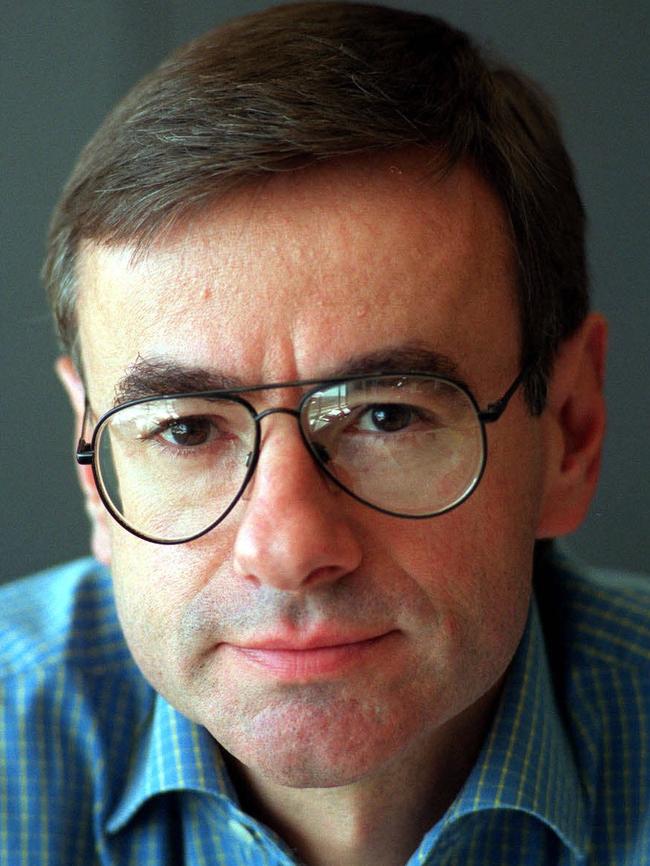
It seems that the powers-that-be at News Breakfast truly believe that the good people of Hobart, Broome and Cairns are vitally interested in what’s going on at the Melbourne Press Club.
Well, as initially revealed by Amanda Meade in The Guardian and The Australian Financial Review “Rear Window” columnists (Joe Aston, Myriam Robin), MPC chief executive Mark Baker along with MPC president Adele Ferguson and MPC vice-president Michael Rowland (yes, him) have quit. This follows an eight month row with influential MPC member Mike Smith over a number of matters, including who should publish the second volume in the series Media Legends: Journalists Who Helped Shape Australia. The first edition was coedited by Messrs Smith and Baker. It contained significant errors re the late BA Santamaria, who made a posthumous entry into the MPC’s Media Hall of Fame in 2014, along with the living treasure Phillip Adams AO etc, etc, etc.
The idea that a couple of ex-journos having a verbal punch-up about the publisher of a book could be big news is far-fetched. But not to Birnbauer who covered the issue on News Breakfast yesterday morning. Here’s a grab of what was said — including the offerings of Michael Rowland who has a dog in this (media) fight:
Lisa Millar: Well I’ve been away for a few days, quite surprised to read the newspaper reports coming in yesterday afternoon that my own colleague here Michael Rowland was making news in The Guardian, just briefly, can you give us a quick snapshot of this?
Bill Birnbauer: Yeah so Michael Rowland, vice president of the Melbourne Press Club.
Michael Rowland: Former.
Bill Birnbauer: Former. The CEO Mark Baker and the president Adele Ferguson all quit yesterday and this comes in the wake of a breakdown in mediation between a life member and former president Michael Smith.
Michael Rowland: He wasn’t a former president, just to get the facts right, former life member.
Bill Birnbauer: Former life member.
Michael Rowland: No, he’s a current life member.
Bill Birnbauer: Current life member and Mark Baker the CEO. I’ve worked with both of them, so I know them very well. Um and they’ve been at each other over a couple of issues for the last eight months. The board delegated to Michael and Adele and a lawyer the job of herding and trying to resolve this. It didn’t happen, so um what [indecipherable cross-talk from all three].
Lisa Millar: I’m not sure even whether we go into the details this morning but can you maybe just give us a final sort of …
At this stage your man Rowland went on and on and on about how good the MPC is — or, perhaps was.
Go on. Really? Yawn. How self-indulgent can you get? And, most importantly — Can You Bear It?
-
In a year when Australians chose a right of centre government, the Walkley Awards finalists in the excellence in the commentary category are all on the left
While on the topic of journalists-on-journalists journalism, thanks to the avid reader who drew MWD’s attention to the finalists in the Walkley Awards for Excellence in Journalism.
Now in a year when so many of Australia’s best and brightest journalists failed to predict the re-election of the right-of-centre Morrison government, it might be expected that some right-of-centre journalists might be short-listed in the “Commentary, Analysis, Opinion and Critique” category. But, no. Not on your nelly. Here are the finalists in this category:
COMMENTARY, ANALYSIS, OPINION AND CRITIQUE
• Waleed Aly, The Age, The Sydney Morning Herald and The Project, Network Ten, “Rage and Restraint”
• Paul Daley, The Guardian, “Interrogating the Past”
• Jan Fran, The Feed, SBS Viceland and associated social media channels, “The Frant”
So there you have it. Waleed Aly, Paul Daley and Jan Fran are all on the left. And the Sydney Morning Herald and The Project, The Guardian and SBS are all left-of-centre outlets. Not a centre-right journalist or centre-right outlet in sight. Can You Bear It?
[Could this be the very same Paul Daley who was emission-shamed in last week’s MWD, when you revealed that he and his wife, The Guardian Australia’s editor Lenore Taylor (whose newspaper “will not stay quiet on climate issues” and “recognises the climate emergency as the defining issue of our times”) are selling their Red Hill pile in Canberra, which has an Energy Efficiency Rating of a lowly 1.5, when the top is 8.0? And is it true that Ms Taylor is the chair of the Walkley Awards Judging Panel? I would be surprised if this was the case, since The Guardian Australia is always lecturing others about perceived conflicts of interest and all that. — MWD Editor.]
Editor’s Note: The Australian accepts Lenore Taylor played no role in judging the Commentary/Analysis/Opinion category of the Walkley Awards. Taylor was not a member of the first round judging panel that selected the finalists. As chair of the Walkley Judging Board, Taylor recused herself from the judging of the finalists in the Commentary category.
-
Media fool of the week
John “I’m a though leader” Hewson forgets about his Southern Highlands mansion and his one-time opposition to native title
What a stunning performance by former Liberal Party leader, and current Liberal Party antagonist, John Hewson on the ABC TV Q&A program on Monday. Dr Hewson (for a doctor he is) was introduced by Q&A presenter Annabel Crabb as “a political leader turned thought leader”. Fancy that.
The program was titled “Future Alert”. As Comrade Crabb put it, the non-politician panel was invited to discuss “the future, and the threats that lie over the horizon … food security, disease, overpopulation [and] artificial intelligence”.
Towards the end of the program — in which, in the familiar ABC way, essentially everyone agreed with essentially everyone else on essentially everything — your man Hewson had this to say:
John Hewson: [Politicians] still don’t listen. You know, when you get a Greta Thunberg and moving a whole global motion — a movement, I should say — they still don’t listen. They don’t want to listen. But business is actually moving. A lot of businesses have signed up on net zero emissions by 2050. A lot of them are adjusting what they do, and it doesn’t necessarily cost them money. You know, I remember, I worked on a printing company about 15 years ago on the board. I asked we get our … “Can’t we cut our carbon footprint?” Big users of electricity, big users of transport and logistics. And the conclusion was, by just reorganising those two, the use of those two, not firing anyone, not cutting anything, you could reduce the cost base of that company by about 25 per cent. It was positive and it made a big difference ….
Needless to say, the audience applauded loudly. After all, the learned doctor is a fave of Q&A’s Sandalista-type audiences. Now, 15 years ago was the year 2004. The very year that John Hewson bought a six-bedroom, five-bathroom, Tudor-style pile named “Invergowrie” in the Southern Highlands of NSW. Oh yes, there was also a ballroom, a billiard room and three separate guesthouses with garaging for six motor cars (of the petrol genre).
So the “thought leader” told Q&A that he cut emissions in 2004 in a printing company. But note that, in the very same year, he purchased an emissions-producing mansion — which he only sold in early 2019. [Perhaps this should have been placed in your highly popular Can You Bear It? segment. Just a thought. — MWD Editor.]

Then, right at the end of the program, there was this:
John Hewson: I think our greatest success in the post-war period has been to build a very tolerant, multiracial, multi-religious, multicultural society. You know, it’s a work in progress, you have to keep at it. But that has been a tremendous development in this country, the envy of the world. It sits in contrast, by the way, to the fact that we haven’t dealt yet with the First Australians and recognised them properly in the Constitution ….
Once again, it was a case of too little information. In December 1993, when John Hewson was leader of the opposition — a political leader rather than a “thought leader” — he condemned the Keating Labor government’s Native Title bill as a “monstrous piece of legislation” and accused Paul Keating of having “sold out” miners, farmers and, yes, “all other Australians” to the First Australians.
So in 2019 John Hewson is complaining that Australia has not recognised First Australians in the Constitution. But in 1993 he accused Paul Keating of having “sold out” Australia by introducing the Native Title legislation.
It seems that Dr Hewson has either a very poor memory or a commitment to double standards.
-
Your taxes at work
The ABC’s advice re nail art and what to wear on Halloween
Thanks to the avid readers who have asked how ABC Life is going. And the answer is — remarkably well. Especially for nail art wearers.
Here’s some of the TOP STORIES currently being carried on ABC Life:
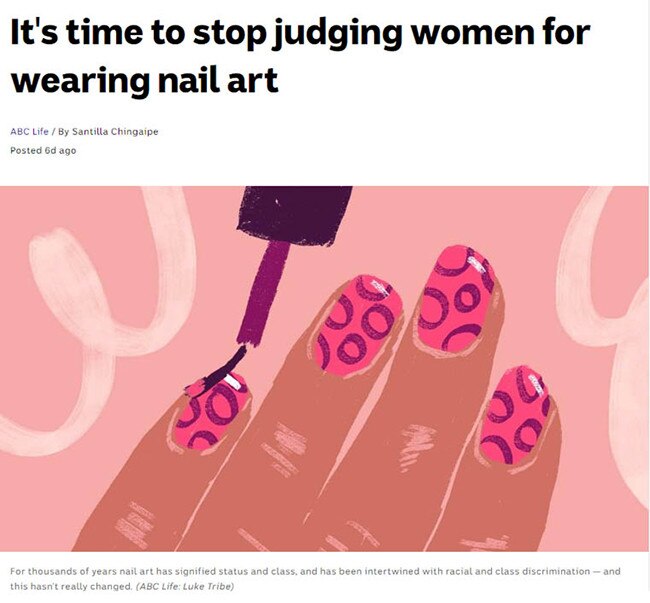
And then there are (useful) tips for Halloween — with, this year, supposedly coinciding with Britain’s exit from the European Union. To wit, Brexit.

So there you have it — for those who wish to dress up and wear nail art on October 31. Your Taxes At Work.
-
MWD scoreboard
Don’t talk about former ABC chairman Professor Richard Downing and “Young Boys” scoreboard
Due to enormous popular demand, MWD is reinstalling MWD’s scoreboards.
This week MWD revisits the fact that in July 1975, (then) ABC chairman Professor Richard Downing defended the (then) ABC Radio Lateline’s decision to present a program titled “Pederasty”. Richard Neville, who in 1975 was a self-confessed pedophile, was the presenter. Richard Neville interviewed sympathetically three self-declared pederasts in the ABC studios. The ABC did not report the pederasts to the NSW Police and did not adopt a duty of care to their victims (some of whom were interviewed for the program).
On July 19, 1975, in his official capacity as ABC chairman, Professor Downing wrote a letter to the Sydney Morning Herald in which he defended the Lateline program and called on Australians to understand pederasty. On the same day, the Sydney Morning Herald quoted the ABC chairman as saying that “in general, men will sleep with young boys”.
Many ABC presenters and journalists expect that religious, secular and government institutions will accept responsibility for past acts of commission and omission of their predecessors. MWD wrote to (then) chairman James Spigelman and later to (then) ABC chairman Justin Milne asking whether they would distance the contemporary ABC from the views and actions of one of their high-profile predecessors Richard Downing. Both declined the opportunity — as the Scoreboard attests.
However, following correspondence with Gerard Henderson which was cited in last week’s issue and explained in his Weekend Australian column last Saturday, new ABC Chair Ita Buttrose, has distanced herself from Richard Downing’s 1975 statement that “in general, men will sleep with young boys”.
Now that this matter has been resolved, the Scoreboard will be taken down and placed in storage. Here’s the final score.
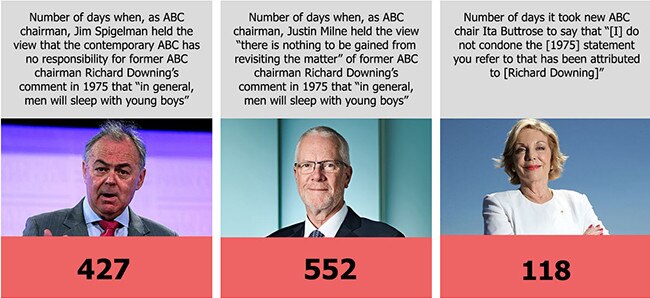
-
Hinch on Hinch
Derryn Hinch, Prince Charles and the throne
There has been overwhelming demand for more news on the “Spin a Yarn” segment — presented by Derryn (“I got a whopping 2.8% of the primary vote in the 2019 Victorian Senate election”) Hinch on Sky News every Thursday. After Dark, of course. Towards the end of the program, a turntable determines what (boring) story The Human Mumble will tell about famous people who have had the privilege of meeting the even more famous Hinch. Last week it was actor Jennifer Lawrence — but more of this later.
According to your man Hinch, the idea of the turntable came from Canberra Press Gallery journalists Annika Smethurst (News Corp) and Rob Harris (Nine Newspapers). MWD does not doubt this. However, MWD believes that the journos were pulling Hinch’s leg in getting him to tell yet more of his oh-so-boring and inconsequential stories about himself. It’s just that The Human Mumble does not understand when people are laughing at him. It’s a narcissistic trait.
Last night, the Hinch media panel comprised Mr Harris and Ms Smethurst. Let’s go to the transcript as the turntable is spun:
[Spin a Yarn intro, lands on Prince Charles]
Derryn Hinch: Ahhh here we go.
Rob Harris: Prince Charles, Derryn. Prince Charles.
Annika Smethurst [smiling]: I reckon you’ve met him. I reckon you’ve come across him.
Derryn Hinch: Well when Princess Di came up I mentioned Princess Di and Chuck at that dinner we had at the Hilton for them. But I’ll give you a more recent one. Um, last year I was lucky to go with the Prime Minister [Malcolm Turnbull] and Tony Abbott to Villers-Bretonneux for the uh, for ANZAC Day and also for the opening of the Monash museum there. And Prince Charles was also there, he was there as the guest of honour. Umm it was pouring with rain throughout the night and when it was all over we all were dashing back to go to a marquee to have a coffee and a croissant. Uh and as we are heading up the hill some of us veered off to go to the portaloo. And when I got there, there were two other people there, so a very odd trifecta. You had Prime Minister Turnbull, Prince Charles and Derryn Hinch. I wish there was a camera but there wasn’t [laughs]. But anyway we’re there and there’s Prime Minister Turnbull earnestly telling Prince Charles and me that if you go to the left there’s a toilet and a door but if you just want to go to the right there’s just a urinal. And so we’re both nodding sagely, people must have wondered: “What the hell are they talking about?” Anyway I did get the line of the night because I turned to Prince Charles and I said: “Prince Charles, I think you should take the throne”.
[3 seconds of absolute silence]
Rob Harris: Uhh
Annika Smethurst: I agree with you Derryn. I think he’s great.
Rob Harris: Derryn, that’s a bad gag. And apparently someone over in the crowd said: “who’s that bloke talking to Derryn Hinch?”.
And, believe it or not, it went on. Derryn Hinch had previously told the “throne” joke before last night. And he went on to tell another tale he had already related on air about Diana, Princess of Wales. Still, blame Mr Harris and Ms Smethurst in the first place for asking Derryn Hinch to speak even more about himself. Groan.
-
New segment — a Jackie apology
To: Phillip Adams AO, etc, etc, etc, etc
In MWD’s (hugely popular) correspondence segment last week, reference was made to Phillip Adams AO, AM, Hon DUniv (Griffith), Hon DLitt (ECU), Hon DUniv (SA), DLitt [sic] (Syd), Hon. DUniv (Macquarie), FRSA, Hon FAHA.
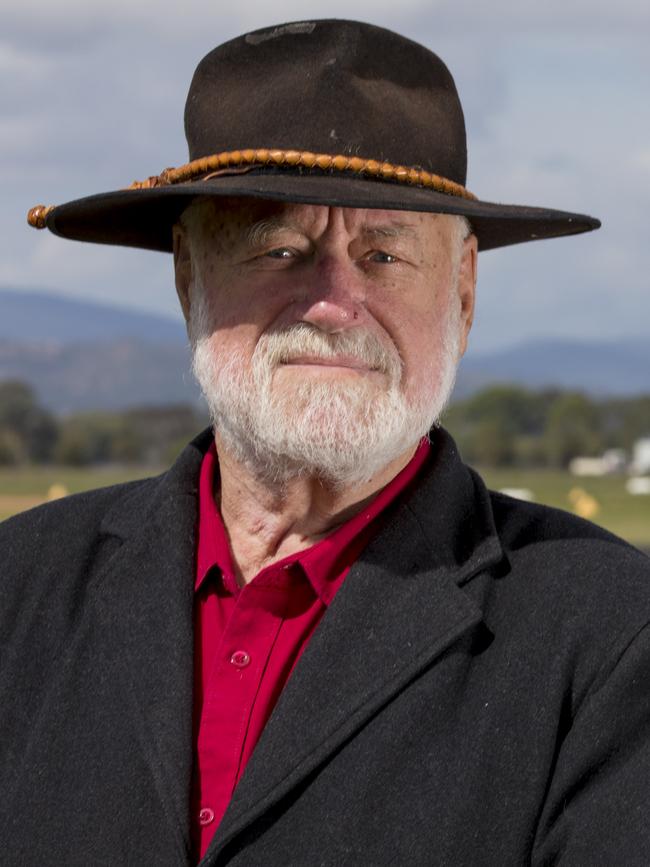
Comrade Adams drew attention to the fact that MWD missed out one of his honorary degrees — and also failed to cite that he is a Living National Treasure and a Member of the Media Hall of Fame. Media Watch Dog also erred in accepting Phillip Adams’ Who’s Who in Australia entry as completely accurate. In fact, his “D.Litt Syd” should read “Hon D.Litt Sydney”. Lotsa apologies.
So, for those contacting your man Adams in the future, here are his postnominals in full:
Phillip Adams AO, AM, Hon DUniv (Griffith), Hon DLitt (ECU), Hon DUniv (SA), Hon DLitt (Syd), Hon. DUniv (Macquarie), FRSA, Hon FAHA, Living National Treasure, Media Hall of Fame (Melb Press Club 2014).
[Wow. Has there ever been a former member of the Communist Party so honoured in Australia? I note that Mr Adams AO etc shares his Living National Treasure gong with, among others, Clive Palmer. Well done to both of them. — MWD Editor.]
-
Correction re Fox News and Scott Morrison
The following exchange occurred on The Ingraham Angle on Fox News last Friday night (US Eastern Daylight Time).
George Papadopoulos, the one-time advisor to Donald Trump, was talking about his famous/infamous drinks with Alexander Downer, Australia’s then high commissioner to Britain. The meeting took place in early May 2016. Let’s go to the transcript:
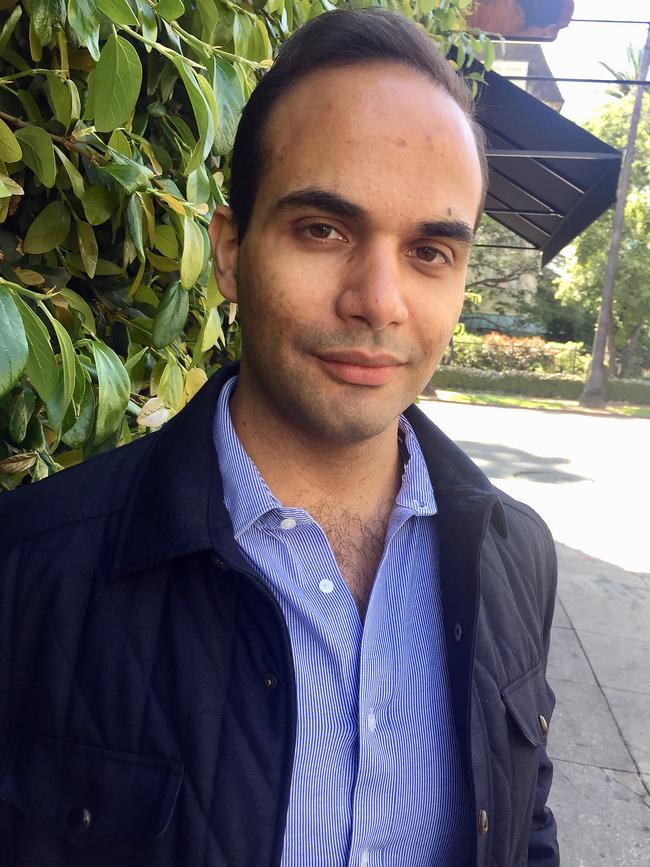
George Papadopoulos: People forget that in 2016, the reason I’m being sued apparently now by the Italian Prime Minister is because the guy in 2016, the socialist Prime Minister Matteo Renzi, and David Cameron in 2016, and Morrison I think — or whoever the leader was in Australia in 2016.
Laura Ingraham: Morrison.
George Papadopoulos: These people detested Donald Trump’s America First platform while America First might have been music to the ear of Americans, it was vitriol to the globalist agenda.
In May 2016, Malcolm Turnbull, not Scott Morrison, was Prime Minister of Australia. MWD thought that Ms Ingraham might like to know this.
-
Correspondence
This overwhelmingly popular segment of Media Watch Dog usually works like this. Someone or other thinks it would be a you-beaut idea to write to Gerard Henderson about something or other. And Hendo, being a courteous and well-brought up kind of guy, replies. Then, hey presto, the correspondence was published in MWD — much to the delight of its avid readers.
There are occasions, however, when Jackie’s (male) co-owner decides to write a polite note to someone or other — who, in turn, believes that a reply is in order. Publication in MWD invariably follows. There are, alas, some occasions where Hendo sends a polite missive but does not receive the courtesy of a reply. Nevertheless, publication of this one-sided correspondence still takes place. For the record — and in the public interest, of course.
On 20 June 2019, ABC TV’s 7.30’s executive producer Justin Stevens wrote to Hendo and stated, with evident irony, “you have a habit of publishing private email correspondence like this”. Quite so, and so it came to pass that his emails were published in Issues 455 and 456. For his part, Jackie’s (male) co-owner reckons it’s a bit much for journalists who spend a large part of their professional life receiving leaked information — including private correspondence — to lecture others about good manners with respect to the handling of private correspondence.
As MWD readers are aware, The Guardian Australia’s deputy editor Katharine Murphy put out the following tweet on June 6, 2014 at 4.33pm, when that issue of MWD was “hot off the press”. Here is Ms Murphy’s tweet: “Without in any way wanting to breach anyone’s human rights or free speech — why do people write emails to Gerard Henderson?” It’s a very good question. Thankfully, not everyone follows Katharine Murphy’s wise counsel — not even, on occasions, Ms Murphy herself (see MWD Issue 297).
Gerard Henderson and Jack Waterford re Victorian Director of Public Prosecutions v George Pell
As MWD readers are aware, Jack Waterford — one of the leaders in the George Pell pile-on in recent years — recently told the High Court of Australia that it “should” refuse Pell’s application for leave to appeal against the majority decision of the Victorian Court of Appeal in George Pell v The Queen. Jack Waterford’s Canberra Times article of August 24, 2019 — titled “High Court should leave Pell alone” was analysed in MWD Issue 470 and followed up in Issue 473. This has led to correspondence. Now read on.
Jack Waterford to Gerard Henderson — October 18, 2019
There is never anypoint in arguing with, especially when thereis achoo e of scripture. But try para 88 of kidd’s judgment for personal words of adoption. You are just making things up.
Gerard Henderson to Jack Waterford — October 22, 2019
Jack
I refer to your (occasionally incomprehensible) email sent out at 5.30pm on October 18 concerning a comment which I made in Media Watch Dog last Friday — with reference to Chief Judge Peter Kidd’s interview with Waleed Aly on The Project (Tuesday 15 October 2019). The Chief Judge responded to a question concerning his sentencing judgment in Director of Public Prosecutions v George Pell. My comment in MWD was as follows:
… Chief Judge Peter Kidd made it clear that his role was to accept the jury’s verdict and sentence accordingly. It is up to an appeal court to decide whether the verdict was unreasonable having regard to the evidence. This demolishes the assertion made by The Canberra Times’ Jack Waterford recently that the trial judge agreed with the jury’s verdict in the Pell case. We simply do not know this. Meanwhile it remains to be seen whether the High Court will give George Pell leave to appeal the decision of the Victorian Court of Appeal.
What I wrote in MWD was completely accurate. On The Project, Chief Judge Peter Kidd made it clear that “when a jury convicts somebody we’re bound to sentence them” and “if the accused wants to appeal” it’s up to an appeal court “to decide whether the verdict is unreasonable having regard to the evidence”.
As someone who studied law at university, and who claims to be a lawyer, you should understand this.
Chief Judge Kidd made similar remarks in his sentencing of judgment in DPP v Pell (Sentence). At Paragraphs 17 and 70-71 he wrote this:
17. I must at law give full effect to the jury’s verdict. It is not for me to second guess the verdict. What this means is that I am required to accept, and act upon, J’s [the complainant’s] account. That is what the law requires of me and that is what I will do.
70. If I am required to identify other explanations as to why you were prepared to take on the risk of somebody walking in on you into the priests’ sacristy, then I do so.
71. By the jury’s verdict, this offending occurred, and no one walked into the priests’ sacristy whilst you were offending. These are facts which I must act upon …
Chief Judge Peter Kidd’s statement in DPP v Pell (Sentence) is emphatically clear. So was his comment on The Project. Namely, a trial judge is bound to accept a jury’s decision.
When, at Paragraph 88, the trial judge said that “on the specific facts” of the case “there was a clear relationship of trust with the victims” and that the defendant “breached that trust”, he was simply implementing the jury’s decision. As the Chief Judge had stated earlier, it was not for him “to second guess the verdict”.
As I wrote in the MWD editorial, it would be improper for a trial judge not to accept a jury’s verdict. So your statement in The Canberra Times on August 24, 2019 that Chief Judge Peter Kidd supported the jury’s decision is DPP v Pell is false. It is true that two judges of the Victorian Court of Appeal supported the jury’s decision — and it is also true that one judge of the Victorian Court of Appeal did not support the jury’s decision. That’s all we know about the Victorian judiciary in this instance.
I note that in your email of last Friday you avoided any reference to Paragraphs 17, 71 and 72 of the judgment in DPP v Pell (Sentence). Convenient, eh?
By the way, I note that you made the following statement on ABC Radio 702 Sydney’s Drive with Richard Glover on October 14, 2019 — with reference to compensation paid to David Eastman after he was found not-guilty of murder on a retrial in the Australian Capital Territory:
Jack Waterford: … as the judge today said, quoting the High Court, what Eastman needed for his court action to get compensation was not a judicial determination of his innocence but merely the absence of a judicial determination of his guilt.
Richard Glover: Yep. Which is our system isn’t it? You’ve got to prove it beyond reasonable doubt.
Jack Waterford: Yes. And I always thought there was a reasonable doubt as to whether Eastman did it. I didn’t think so myself but I admitted that there was some evidence that pointed in that direction. What always agitated me about that case, though, was that the evidence was very thin and I think it remains so to this day.
There is an issue of double standards here. For many years you expressed concerns about David Eastman’s conviction in 1995 for the murder of Colin Winchester in the Australian Capital Territory. As you discussed once with me quite a few years ago, you thought that David Eastman might have murdered Colin Winchester but you doubted this. You believed that there was a reasonable doubt as to whether he did so. Fair enough. As you know, under our legal system, a defendant is entitled to a presumption of innocence.
However, you appear to have a different approach when it comes to George Pell. You believe that David Eastman should have been acquitted — even though there was “some evidence that pointed” in the “direction” of his guilt. However, you believe that George Pell should have been found guilty — even though there was no forensic or other objective evidence and no independent witnesses that pointed to his guilt. There was only the word of the complainant, “J”, which was not supported by any of the witnesses who gave evidence at the trial.
I do not understand why you would have one attitude as to what constitutes reasonable doubt with respect to David Eastman and another one with respect to George Pell. Except that you are a Pell-antagonist of long standing.
There is one other matter with respect to double standards in this instance. Civil libertarians, like you, invariably express concern if someone is likely not to receive a fair trial.
Yet there has never been, in recent memory, such a pile-on in the lead-up to a charge, a trial and a conviction as occurred in DPP v Pell.
The pile-on included such media outlets as the ABC (particularly 7.30, Four Corners and Q&A), Fairfax Media (now Nine Newspapers), Channel 9 (60 Minutes), Channel 10 (The Project), The Guardian Australia, The New Daily, The Saturday Paper, Sky News (Paul Murray Live, Hinch), The Monthly, Daily Mail and more besides.
The anti-Pell pile-on included such well known media personalities as Louise Milligan, David Marr, Peter FitzSimons, Paul Kennedy, Paul Bongiorno, Dee Madigan, Tim Minchin, Derryn Hinch, Lucy Morris-Marr, Waleed Aly and more besides — including your good self. And then there were hostile references to Pell made by Gail Furness SC in her role as Counsel Assisting the Royal Commission Into Institutional Responses to Child Sexual Abuse.
In Victoria, George Pell was denied the right to trial by judge alone. It was asking a lot of a jury, in the social media era, to dismiss all the anti-Pell hostility in the lead-up to the trial. And then there is the issue of unconscious bias (rather than deliberate bias) for jurors who were instructed to dismiss the anti-Pell hostility of which they were aware.
As The Australian reported on October 14, 2019, former Western Australian governor Malcolm McCuster QC and criminal lawyer Tom Percy QC have supported moves in Western Australia to extend that State’s provisions with respect to trial by judge alone.
As Tom Percy QC told The Australian:
“You get people like Pell who are simply untriable by a jury and who never had a ghost of a chance in front of a jury. He will never know why he was convicted because the jury never gave any reasons and the Appeal Court can only speculate as to what the jury might have thought and how they might have resolved the issues.”
Paul Garvey’s report continued:
“Mr Percy said the combination of the rise of the internet — which made it far too easy for jurors to access material about the case and the defendant that would be inadmissable in court — along with a “hysteria” in the community around drugs, motorcycle gangs and sexual assault meant there was a stronger presumption of guilt in today’s juries.
“Sometimes you see that reaction from a jury before they’ve heard any evidence. They’re gasping and rolling their eyes as the charges are read out,” he said. “Most seasoned criminal barristers have changed their minds over the past two decades and would think the only chance of a fair trial these days is a trial by judge alone.”
In conclusion, I do not expect that you will ever concede that George Pell did not receive a fair trial in view of the fact you are a Pell-antagonist of long standing.
However, you would be well advised to desist from your erroneous claim that Chief Judge Peter Kidd supported the jury’s decision. As the trial judge has made clear, no one knows how he viewed the verdict. And that includes you.
Yours sincerely
Gerard Henderson
Jack Waterford to Gerard Henderson — October 22. 2019
The complete difference between the Pell case and the Eastman case is that, in my view, the evidence used to convict Eastman was legally insufficient to prove his guilt beyond a reasonable doubt. On that view, and on my view that the prosecution was guilty of constructive misconduct (in failing to draw to the defence’s material of a potentially exculpatory nature), police misbehaviour (in harassing and intimidating Eastman, on the advice of a psychiatrist in the hope that he would “break”, and the farce of a trial (caused in part by Eastman’s “forensic suicide” but also by the judge’s mistaken belief that Eastman’s disturbed behaviour was just “putting it on.”) I also thought that some evidence (for example claims that in almost incoherent bugged soliloquys, Eastman had effectively confessed, should not have been admitted. My opinion of these matters, expressed from the day of conviction was based on that opinion that the verdict was legally unsafe. I allowed the possibility that Eastman might have done it, but, I said, it had not been proven that he had. By contrast, the evidence against Pell was capable, if believed, of satisfying all of the legal elements of a case. A jury heard the evidence of the complainant. They heard an extensive cross-examination. They witnessed a videotaped record of interview in which Pell denied it, but they were entitled, in assessing that ROI to assess his demeanour as well as his denials. In any event, they obviously disbelieved him. The jury heard the Crown warnings of what was necessary to convict Pell. They heard defence counsel Robert Richter give reasons why they should not find Pell guilty. They heard a down-the-middle summary (to which to objection was taken) by the trial judge. The judge repeated all of the defence arguments. The jury found Pell guilty, meaning that they must have rejected, beyond reasonable doubt, what George had said in denial — presumably on the word of the accuser but after taking into account all of the other corroborative evidence about cathedral geography, timetables etc. That some of that evidence came from people who doubted GP’s guilt did not mean that fact bits of their evidence could not support the prosecution case. The Court of Appeal heard Richter’s arguments restated by Brett Walker QC. As I have commented before, Walker may have dressed up Richter’s arguments, but he did not introduce fresh arguments. The argument of both was that it was either so impossible or so improbable that Pell could have committed an offence that Pell could not have been convicted beyond a reasonable doubt. Weinberg agreed with this argument: in adopting it, he did no more than restate the arguments already made by Richter and Walker: he introduced no fresh fact., interpretation or argument. By contrast, the two other judges began by noting that no exception had been taken to the way the trial had been conducted, or to the instructions on matters of law given by the trial judge. Given that the jury had no doubt of Pell’s guilt, they asked themselves whether there was a logical and coherent path through the evidence by which they jury could have arrived at that conclusion, and beyond reasonable doubt. (They found there was). They examined, at great length and with great care, the Richter submission’s (including, by now Weinberg’s and Walker’s glosses on them) and found that, and found that these arguments about the facts did not present an insuperable barrier to a verdict of guilt beyond reasonable doubt.
It does not matter much to me whether Kidd privately agreed with the jury verdict or not — though I note that if he thought Pell could not be convicted because the evidence was insufficient, he should have/would have intervened to direct an acquittal. I note that he has on several occasions, including in the sentencing, said he was basing his remarks on the jury verdict, rather than his personal view of the facts. The forms of his summarising show his attempt to do this. But I do think that in the paragraph 88 to which I referred, he indicated his private opinion. I note4 also that you only paraphrased what he said — lest you admit that this was possible.
What Kidd said was:
In any event, Cardinal Pell, I find, beyond reasonable doubt, that on the specific facts of your case, there was a clear relationship of trust with the victims and you breached that trust, and abused your position to facilitate this offending.
Had Kidd been merely summarising, without adoption, the jury’s obvious conclusion, he would not have had to include the italicised words (ones you, perhaps deliberately, omitted).
Not much turns on this, other than that it leads me to think that Kidd had no problem with the jury’s findings.
I cannot see any profit in continuing this correspondence. You seem to think that I confine my scepticism only to cases, or causes, of some fashionably left persuasion. I think that your anxiety to keep George on some plinth has completely overcome your judgment.
Gerard Henderson to Jack Waterford — October 25, 2019
Jack
I refer to your stream-of-consciousness email of October 22, 2019. In response, I make the following comments:
▪ I note that you completely ignored my point as to whether so high profile a person as George Pell could receive a fair trial in the era of social media. Especially since there had been a decade-long media pile-on against Pell — in which you (among others) were a willing and active participant. This is especially the case in a climate of anti-Catholic sectarianism which, as Paul Collins (no friend of Pell) recently said, has been a feature of Australian life since European Settlement in 1788. As Dr Collins has pointed out, this has ramped up again following the historical child sexual abuse crisis in the Catholic Church.
▪ I am not suggesting that the jury was consciously biased. But I am saying that it would be difficult for jurors to put aside all the relentlessly hostile media towards Pell — especially in view of what we know about unconscious bias.
Graham Ashton, Victorian Police’s chief commissioner, publicly declared that some complainants were in fact “victims” of Pell — even before he was charged with historical child sexual abuse. Earlier, Victoria Police called for victims who had been assaulted at St Patrick’s Cathedral in designated years (when Pell was Archbishop of Melbourne) to report the crimes for which they were victims. Such practices have been condemned in Britain following several cases where false allegations were made against high profile individuals.
As you know, there is no right to trial by judge alone in Victoria — unlike in other mainland states. Trial by judge alone has been introduced in Australian states because it is recognised that juries, on occasions, do make mistakes.
▪ The fact is that there was no forensic or other objective evidence against Pell and no independent witnesses. None of the witnesses who gave evidence in DPP v Pell supported the complainant’s allegations which related to a sexual attack at St Patrick’s Cathedral at a time when between 350 and 500 people were present at a Solemn High Mass.
▪ You have no evidence to support your assertion that Chief Judge Peter Kidd agreed with the jury’s verdict. To hold this view, you have to ignore what he said in DPP v Pell (Sentence) at Paragraphs 17, 70, and 71 along with what he told Waleed Aly on The Project. The Chief Judge’s comment at Paragraph 88 is consistent with his statement at Paragraph 17 that the jury had found Pell guilty beyond reasonable doubt and it was not a trial judge’s role to second guess the jury. In any event, if you have any doubts you can check out your assertion with the Chief Judge himself. After all, he spoke to The Project and might also be willing to speak to The Canberra Times.
▪ I agree with Justice Mark Weinberg’s dissenting judgment in George Pell v The Queen. Justice Weinberg, whom you attempted to ridicule in your Canberra Times article, was the most experienced judge in criminal law matters on the bench in this case. Certainly Justice Weinberg knows much more about criminal law than you do — a fact you overlooked in this correspondence.
▪ In conclusion you assert — without any evidence — that I am suffering some kind of “anxiety” with respect to this matter. As this correspondence reveals, my comments, and the manner in which they are written, have been measured and supported by evidence. On the other hand, your correspondence is emotive and, at times, incoherent. For example, I still have no idea what the reference to “achoo e of scripture” in your initial email means. Do you?
As far as I am concerned this correspondence has concluded.
Until next time.




The word out of ABC headquarters in the inner city Sydney suburb of Ultimo is that the new chair Ita Buttrose and the new managing director David Anderson are into diversity. All kinds of diversity, it seems — except for political diversity.